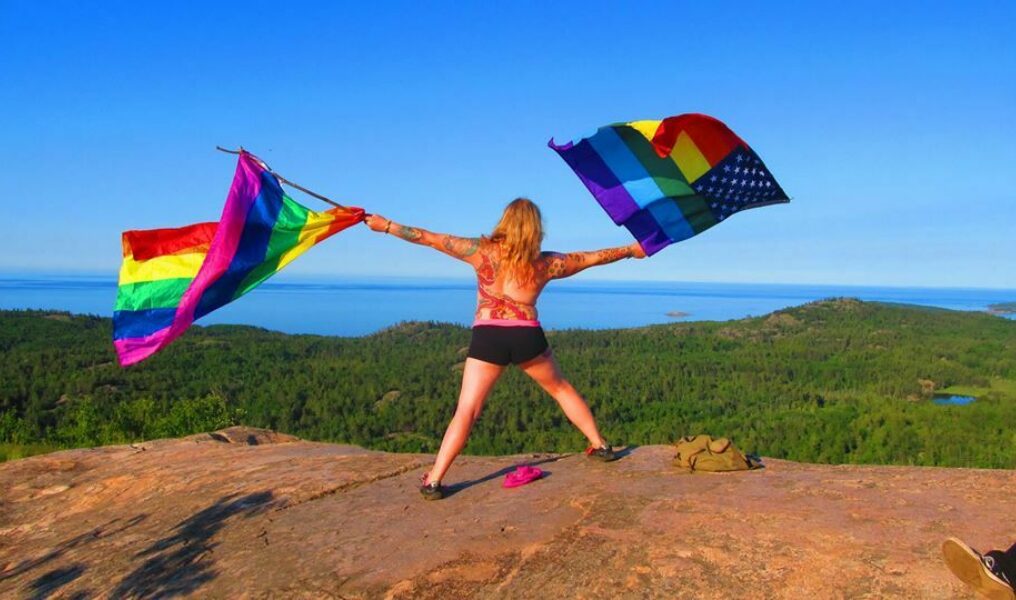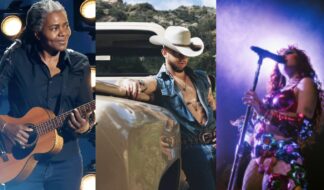The state of Michigan is a mixed bag when it comes to LGBTQ+ equality. Major cities such as Ann Arbor and Detroit and vibrant hubs like Ferndale and Saugatuck are vocal about support for LGBTQ+ people. Still, the state does not include legal protections for LGBTQ+ people in the 1976 Elliott-Larsen Civil Rights Act. How protected an LGBTQ+ person is in Michigan depends largely on where in the state they call home.
Local Michigan governments are increasingly passing Pride proclamations and human rights ordinances intended to make LGBTQ+ people feel welcome and seen. There have been attempts to expand Elliott-Larsen, but this has been a dead end with Republicans controlling both the Michigan House and Senate. This is one reason these local efforts are especially meaningful.
It might not seem like a big deal to some if, say, a city hall flies a Pride flag in June or when a city paints a crosswalk in rainbow colors. In the face of historic LGBTQ+ discrimination and a continued lack of legal protections, however, such an act goes beyond symbolism.
The fact is, LGBTQ+ people are everywhere in Michigan. From up north to Downriver, Pride in the Great Lakes State radiates from unexpected places.
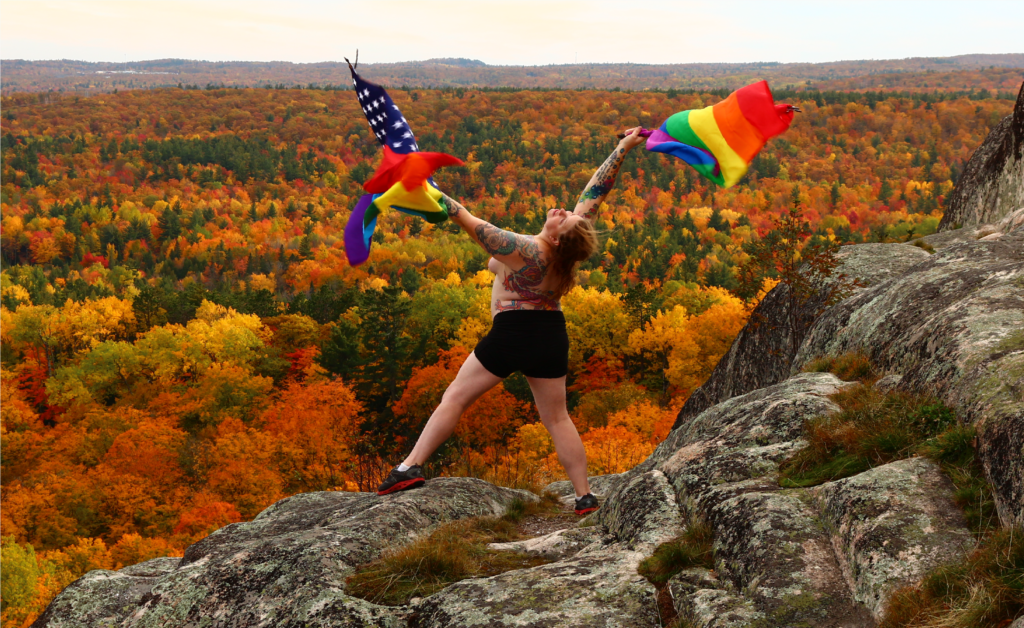
Marquette/Big Bay
When it comes to areas rich with LGBTQ+ culture and acceptance in Michigan, the upper peninsula isn't usually what comes to mind. But Upper Peninsula Rainbow Pride (UP Pride) has been holding Pride since 2014, one year after the organization was founded.
Big Bay resident Marissa Jayne Wolfe, 39, was inspired to create UP Pride after taking a trip with some friends to Chicago Pride. Wolfe says that while there were some drag shows and small gatherings in the UP, "there was no Pride Fest."
"When I came out in 2009, there weren't many trans people around," Wolfe tells Pride Source.
That is pretty much still the case. "In Big Bay, there really aren't many LGBTQ people here who are out," she says. "We're kind of behind the times, at least as far as people being exposed to things. I guess some places up here you feel like you're in the '60s."
Coming out was not easy. "I transitioned from male to female in 2009, and it was no picnic," she says. "I was spit on, denied housing, had to fight for my job and the right to see my daughter, and dealt with a lot of discrimination and harassment."
That said, Wolfe sees changes and feels things are safer now. "Ten years ago, 99% of the people around here would probably say, 'I've never heard of a transgender person.' Now everybody here probably knows someone who is transgender or gay or transitioning or LGBTQ."
Michael Bradford, 27, who serves as UP Pride's treasurer, lives in Marquette, "which, compared to the rest of the UP, is far more progressive," he says. "I like to say it's a blue island in a sea of red."
Bradford has seen progress in LGBTQ+ acceptance but acknowledges he's noticed some backsliding during the Trump presidency.
His connection to LGBTQ+ rights is personal. "Growing up, I lived and was raised with a fairly religious family. I had an uncle who was gay, and I always had a good relationship with him," Bradford says. "It wasn't until I was in a youth group and I asked what was going to happen to my uncle, and they basically straight up said he's going to hell."
Bradford refused to accept this, marking his beginning as a vocal LGBTQ+ ally, which eventually led to his involvement with UP Pride.
UP Pride started small. "Our first meeting in 2013, we had maybe five people. At the second meeting, we had maybe 15 people, and people kept coming back," Wolfe says. "I think they realized there was a need for it." She estimates that about 1,500 people attended the first Pride fest.
As UP Pride has grown, the group has attracted more attention, for better or worse. The last Pride Fest [in 2019] was the first one we had a lot of protesters at," Wolfe says. As she begins to say that protesters are "going to hate and fear," she pauses, momentarily distracted.
"Oh," she says. "There's an otter swimming by." She explains that she is staying at a cottage on the lake. "Sometimes you see a lot of ducks and geese and chipmunks and otters, and occasionally a deer will step out on the sand bar."
Bradford says he's stayed in the area partly because of its natural beauty. "I'm originally from the suburbs of Chicago, and I came up here for college and never left," he says.
Like everywhere else, UP Pride has had to adjust its Pride plans in the face of COVID.
"2020, last year, was supposed to be our 7th annual Pride Fest," Wolfe says. The festival's inevitable cancellation was especially painful because it would have been the first year in a new, more visible location.
UP Pride still wanted to hold some kind of celebration in 2021, however. "Something to show that we're still here, the community isn't going anywhere, and that we're not going to be slowing down any time soon," Bradford says.
The result is Ride with Pride. "We didn't know what COVID was going to be like. No one knew. So we decided to do something with vehicles that would be safe and public," Bradford says.
On Saturday, June 26, Ride with Pride will kick off at 4 p.m. with a promenade around Marquette starting at the Northern Michigan University PEIF parking lot.
"Decorate your cars," says Bradford. "If you don't have a car, decorate your bike. If you don't have a bike, decorate yourself."
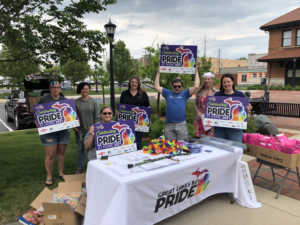
Volunteers from Great Lakes Bay Pride and Dow GLAD distribute Pride At Home signs in Bay City. Photo courtesy of Scott Ellis.
Bay City
Scott Ellis, 30, Executive Director of Great Lakes Bay Pride (GLBP), says he lives "in the greatest region in the world."
"I love that we have really four distinct communities in Bay, Isabella, Midland and Saginaw counties," he says. "So much culture and diversity." He lists some of the attractive community benefits found throughout the region: baseball teams, casinos, universities, Frankenmuth, Saginaw Bay, hiking trails, nature trails, the Dow Gardens and more.
"Everything you could possibly need we've got here," including Lake Huron, "a Great Lake that's four miles away from my house."
Ellis has lived in the region for about 12 years, settling here after attending Saginaw Valley State University. He currently lives in Bay City.
"I have been out pretty much since the start of college," he says, adding that after coming out to close friends, he participated in a radio interview for National Coming Out Day and basically "came out to 5,000 people." He adds, "I really did make a splash when I announced it. I wanted to go big or go home."
The Great Lakes Bay region isn't known as a bastion of progressive politics or a place that attracts young people. Ellis says, "When I was going to school [at SVSU], I often felt like there was an attitude of 'get in, get your degree and get out.'"
But that's not what Ellis did.
"There are a lot of opportunities here to grow and do new things and get started," he says. "So I really made that conscious decision to stay in the region, and I say that's one of the best decisions I've ever made because I chose to call this place home, and I've loved every minute of it."
He knows it's not for everybody. "I think everybody has their own idea about the life they want to build, and for so many, especially for LGBT people, they want to look for those pockets. Usually, that means bigger cities which come with their own host of issues: really volatile housing markets, you have to have a good job, a degree, lots of different factors to make it in some of those places, even here in Michigan. That's not restricted to L.A. or New York or Chicago."
That's not to say there isn't work to do in the region. "I know that there are folks though, depending on their job situation or even their family situation, who are not able to be their authentic selves," he says. "It's hard to see. We have a long way to go toward building an inclusive community."
As they did last year, GLBP is distributing yard signs so people can celebrate "Pride at Home." In 2020, they distributed 600 signs. The goal this year is 1,000.
"I believe we have far more allies in our region than we probably even know. And so that to me is a good thing," he says. "We're moving in the right direction."
Ellis encourages young people to make the Great Lakes Bay region their home. "Our community is aging, and so we need younger people to either come back here or stick around here in order to really create the communities that we want," he says. "So I would encourage folks to think about that and really consider it. We're happy to have you back."
Meanwhile, he will keep working to make the region more desirable. "It's my mission in life to turn us into the gay mecca of northern Michigan," he says.
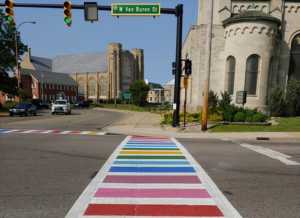
The rainbow-painted crosswalk in Battle Creek Michigan. Photo courtesy of Deana Spencer
Battle Creek
Deana Spencer, co-president of Battle Creek Pride (BCP), has lived in the Battle Creek area her entire life. However, she can't really speak to how the region has changed regarding LGBTQ+ acceptance because, for a long time, it was simply not on her radar.
"I didn't come out until I was in my 30s," Spencer tells Pride Source. She got married when she was 19 and had children. "Just really surpassing who I was all those years."
"I didn't really know the climate [for LGBTQ+ people] in Battle Creek because it didn't pertain to me and my life, so I never looked at it," she said. "Not even as an ally. I was almost terrified of it. And so I didn't."
This fear stemmed from something that happened just seven years before she got married.
"I had an experience when I was 12 years old of being in love with another female, and my parents found out and told me how sinful and wrong it was, and it was really traumatic for me," she says. "I knew it was not an option. Period. The end. That's all there is to it. So I never explored it again."
But she hadn't forgotten.
Spencer was working in a grocery store when she reconnected with her first love. "She came through the checkout line," Spencer says. "Through all those years, I had seen her in passing in Battle Creek a handful of times [but] I hadn't spoken to her since I was 17 or 18. And just out of the blue, I don't even know what in the world came over me, I said, 'How have you been? I was thinking of you and want to know if you want to catch up.'"
They exchanged phone numbers. "I called that night, and we never stopped talking from that minute forward."
Spencer divorced her husband and married the person she'd been in love with since she was 12, Mitzi Harrison.
Spencer and Harrison had bonded over a shared love for Joan Jett when they were kids, something they continued as adults. "The first thing we did when we first started hanging out with each other is that we went to a concert in Detroit. That became our thing. We followed her around."
Sadly, at the last Joan Jett show they attended together, Harrison suffered a stroke. She died the next day.
Since this traumatic event, Spencer has moved on with her life, including making a new love connection with Kim Haist, her current partner. "I have a wonderful partner now," Spencer says. "I don't question my life anymore, not one single thing. And I haven't since I came out."
This conviction is perhaps why she feels things are moving much too slowly in Battle Creek when it comes to LGBTQ+ acceptance.
"It isn't always progressive," she says. "I think people want to think that it is, but I don't think it always is. As a leader, it's frustrating."
As an example, she points to crosswalks BCP painted for Pride a couple of years ago.
"I swear you would have thought the world came to an end," she says. "It literally blew up in our faces, and it was such a controversy here and such a drama."
Facebook exploded with homophobic and transphobic comments, she says. While BCP knew the paintings were intended to be temporary, Spencer quietly hoped the city would decide to keep them once they were installed. That did not happen.
As disappointed as she was, Spencer acknowledges that even five years ago, there wouldn't have even been a crosswalk painted for Pride.
The slow progress happening in Battle Creek leads to an inevitable question: Why stay?
"As much as I complain about Battle Creek, it's what I know," she says. "And I don't hate Battle Creek. There are things about Battle Creek that I love."
Family is one big reason. Spencer's kids and her partner's family are there.
"I'm one of those people where if I'm comfortable, I'm comfortable," she says. "I feel like Battle Creek still needs a bit of shaking up, and I guess I'm here to do that."
Haslett
Not everyone finds sticking around where they grew up to be what's best for them when it comes to living as their authentic selves.
Learned Foote, 33, currently lives in Houston, but he grew up in Haslett, a rural community near East Lansing.
His closest neighbors were about a mile away, and he spent his free time playing in the woods with his siblings and cousins.
"I was homeschooled, so a lot of my socializing was with my family and my church," he tells Pride Source.
He recalls that when "Lord of the Rings" came out in 2001, "I loved the movie and sort of had a crush on Elijah Wood at the time." But his friends from youth group made fun of the hobbits because they would hold hands and look into each other's eyes, something his friends read as gay. Foote, however, identified with the characters.
That same year "Moulin Rouge" came out. "I was obsessed with it but was scared to like it because it was like if you liked it, then you were gay."
The following year, "The Hours" was released. "It was much more specifically about being lesbian and being queer, and I went to see that in theaters with my mom before I came out to her," he says. "I remember her saying afterward, 'That's a sign of what happens when you don't have God.'"
In other words, being gay was not an option.
"[Homosexuality] was not supported at all," he says. "Not in my church or my family, and it was not talked about, but if it was talked about, it was in very negative terms by the adults around me."
Foote's coming out experience was sudden.
"I came out to [my parents] when I was 15, basically because my youth pastor wrote about it in his secret blog," he says.
The pastor, who was fired, had been keeping a blog where he would write about problems with the church. "I think he was more progressive and more liberal and frustrated with the attitudes of the church. And one of the topics of the blog was, 'I have a kid who told me he's gay. How do I help him have a happy life?'"
The senior pastors figured out that the kid in question was Foote. Soon, he says, they "stepped in and said your parents need to know."
"They tried to make me see a therapist for a few months, and I was not into it at all," Foote says. "And I had to sit down with the pastor every week and talk about scripture and why it's bad to be gay, but I was kind of a rebellious teenager at that point."
He says, "The teenagers, people my age, were getting the sense that things could be different."
This sense came in large part to Haslett's proximity to Michigan State University.
Foote remembers taking guitar lessons at Marshall Music in Lansing, where he saw a periodical from MSU that clued him in to the existence of an LGBT community. "I didn't know how to access that community, but I knew it was out there," he says. He also used to frequent a coffee shop at MSU to "see if other gay people might show up or imagine who would be gay."
When he was 16, Foote got his driver's license, which opened up his world even more. He began attending Lansing Community College, where he read queer and feminist texts and often drove to Royal Oak to see movies at the Main Art Theater.
Coming out strained his relationship with his family. His parents were not accepting.
"For a few months, they'd be like, 'We love you, but we don't accept the lifestyle,' so we just didn't talk about it for years."
Eventually, Foote left to attend Columbia University in New York, the city where he was born.
"I had family there, and I kind of had the idea that it's kind of like a gay magnet," he says. "I wanted to be sort of in the gayest, most liberal place possible, and that seemed like New York to me."
He says he sees things a bit differently now. "I wouldn't say Michigan is homophobic and New York is not because in New York you can still encounter homophobia, and in Michigan, you can still encounter queer community."
Foote says it's hard to separate his experience in the small city of Haslett from his experience in the larger and more progressive East Lansing. Both cities played significant roles in his coming-of-age experiences.
On the bright side, things are changing in Haslett, at least among Foote's family members. "I feel like [my parents] eased up a bit over the years," he says. Between him coming out and a sister announcing that she's atheist, "my parents' dreams of raising perfect Christian children were dashed."
Recently his sister got married, Foote says. "And I brought my partner to her wedding."
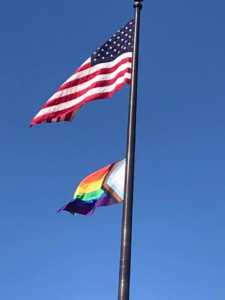
An inclusive Pride flag flies beneath the American flag in Trenton.
Trenton
In 2013 Trenton was the first Downriver community to pass a human rights ordinance that included LGBT people. And in 2021, the city raised its first rainbow flag in an official observance of Pride.
Patrick Taylor, 33, is the chair of the Trenton Cultural Commission, which made the recommendation to the Trenton City Council to raise the Pride flag. "It passed unanimously and so quickly," he tells Pride Source. "There was no debate, no discussion."
A Trenton native, Taylor came out as gay in 2004 when he was in 9th grade.
"There was, of course, occasional teasing from kids at school, but it wasn't anything like some of the stories you hear and read about where it's just incessant bullying and traumatizing for a lot of people," he says. "I never went through that."
Taylor left Trenton to go to college and moved back to the Downriver area about 10 years later, during the 2016 election.
"I'll be honest, it was kind of a bummer to see a lot of support for Trump in terms of signage throughout the community," he says. "Because when I left Trenton to go away to school, it didn't really seem like that was the direction the community was headed in. It seemed a lot more progressive-leaning."
Taylor's perception was partly due to Trenton's 2013 passage of anti-discrimination legislation aimed at protecting LGBT rights, Ordinance 777. Taylor's father, who he describes as "a bleeding heart liberal," served on the Trenton City Council from 1989 to 2013 and had a direct hand in the ordinance's passage.
The raising of a Pride flag this year is an important symbol of the "progress that we can continue to make," says Taylor.
For Kurt Forrest, 18, Trenton's Pride flag means a lot.
"It really does help me feel accepted," says Forrest. "It makes home feel a little more homelike, I suppose."
Forrest came out as transgender and gay during his freshman year of high school in 2016.
"I transitioned pretty much all at once," Forrest tells Pride Source.
"I knew for a while that I wanted to identify as male, and I pretty much showed up one day with a binder and a short haircut and a new name and a new set of pronouns," he says. "And I found out pretty quickly who was supportive and who wasn't."
Still, it was worth the risk. "It was scary but freeing," Forrest says. "Like being on a roller coaster and coming toward the ground. You're afraid of being ostracized and mocked, but at the same time, it also feels, I can't think of any other word than 'freeing.'"
Forrest has a strong support system and is grateful for that. Both of his parents and his grandmothers are "really supportive."
"I think having adults who are supportive, and not only supportive but also members of the LGBTQ community themselves, is probably the best part of the flag-raising ceremony as a whole for me because it's the idea that we can have a future," Forrest says. "I know a lot of LGBT teens who don't know where their life is going to go and how stable things will be and if things will ever get better and being able to see all the adults there, it shows me and a lot of the other kids and teens that were there that there is a future and there is a possibility for the future."
Forrest attended the flag-raising ceremony with his mother, Bonnie Forrest, who also served on the Cultural Commission.
"Pride means community," she tells Pride Source. "You look around and think, 'Yes, this is our community, these are our people. This is our base, our home.'"
